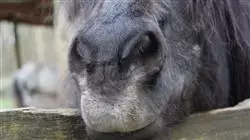University certificate
The world's largest faculty of veterinary medicine”
Introduction to the Program
The most complete and up-to-date program in Neurological and Muscular Problems in Hospitalized Equine Patients on the online educational market"

This program lays the foundations for a specialization in Equine Hospital Medicine. It defines the logistics and clinical strategy required in a hospital for horses. It addresses various topics, extremely necessary in order to acquire a global idea of how an equine hospital works and to consider the hospitalization of any patient regardless of their main pathology.
It describes the layout of the different facilities and establishes the necessary guidelines for the cleaning and disinfection of different areas in relation to their degree of contamination by the patients treated in each one. Develop specialized knowledge on advanced pharmacology for hospitalized patients. This program establishes the ideal pharmacological guidelines, antibiotherapy and multimodal analgesia applicable to each patient depending on their severity, which differs greatly from the approach used in field clinics.
Due to the severity of the clinical symptoms presented by most hospitalized patients, it is necessary to establish specific guidelines for fluid therapy and nutrition according to the stabilization requirements and metabolic needs of each patient.
Finally, in the first section of the program, the interpretation of blood count, serum biochemistry and blood gas analysis are discussed as it is very important to establish the severity of hospitalized patients. These diagnostic methods will also be key to monitoring the patients during the hospitalization period.
In the second part of the program, neurological diseases in which injury localization is the cornerstone of the diagnostic process. The possibilities of diagnostic imaging are becoming more and more advanced, but require specific facilities and specialized knowledge for their interpretation. In the case of neuromuscular diseases, anatomopathological diagnosis is crucial in most of them, along with analytical alterations.
Join the elite, with this highly effective program and open new paths to help you progress in your professional career"
This Postgraduate certificate in Neurological and Muscular Problems in Hospitalized Equine Patients contains the most complete and up-to-date scientific program on the market. The most important features include:
- The latest technology in online teaching software
- A highly visual teaching system, supported by graphic and schematic contents that are easy to assimilate and understand
- Practical cases presented by practising experts
- State-of-the-art interactive video systems
- Teaching supported by telepractice
- Continuous updating and recycling systems
- Autonomous learning: full compatibility with other occupations
- Practical exercises for self-evaluation and learning verification
- Support groups and educational synergies: questions to the expert, debate and knowledge forums
- Communication with the teacher and individual reflection work
- Content that is accessible from any fixed or portable device with an Internet connection
- Supplementary documentation databases are permanently available, even after the course
A complete program that will allow you to acquire the most advanced knowledge in all the areas of intervention of the Equine Veterinarian"
TECH teaching staff is made up of professionals from different fields related to this specialty. In this way TECH ensures that it delivers the educational up-to-date objectives that it aims for. A multidisciplinary team of professionals, experienced in different fields, will develop the theoretical knowledge in an efficient manner, but, above all, will provide students with practical knowledge based on their own experience: one of the differential qualities of this program.
This mastery of the subject matter is complemented by the effectiveness of the methodological design. Developed by a multidisciplinary team of e-Learning experts, it integrates the latest advances in educational technology. This way, you will be able to study with a range of comfortable and versatile multimedia tools that will give you the operability you need during the program.
The design of this scientific program is based on Problem-Based Learning: an approach that views learning as a highly practical process. To achieve this remotely, telepractice will be used: with the help of an innovative interactive video system and Learning from an Expert, students will be able to acquire knowledge and skills as if they were facing the scenario they are learning at that moment. A concept that will make it possible to integrate and fix learning in a more realistic and permanent way.
With the experience of working professionals and the analysis of real success stories, in a high-impact educational approach”

With a methodological design based on proven teaching techniques, this innovative course will take you through different teaching approaches to allow you to learn in a dynamic and effective way"
Why study at TECH?
TECH is the world’s largest online university. With an impressive catalog of more than 14,000 university programs available in 11 languages, it is positioned as a leader in employability, with a 99% job placement rate. In addition, it relies on an enormous faculty of more than 6,000 professors of the highest international renown.

Study at the world's largest online university and guarantee your professional success. The future starts at TECH”
The world’s best online university according to FORBES
The prestigious Forbes magazine, specialized in business and finance, has highlighted TECH as “the world's best online university” This is what they have recently stated in an article in their digital edition in which they echo the success story of this institution, “thanks to the academic offer it provides, the selection of its teaching staff, and an innovative learning method aimed at educating the professionals of the future”
A revolutionary study method, a cutting-edge faculty and a practical focus: the key to TECH's success.
The most complete study plans on the university scene
TECH offers the most complete study plans on the university scene, with syllabuses that cover fundamental concepts and, at the same time, the main scientific advances in their specific scientific areas. In addition, these programs are continuously being updated to guarantee students the academic vanguard and the most in-demand professional skills. In this way, the university's qualifications provide its graduates with a significant advantage to propel their careers to success.
TECH offers the most comprehensive and intensive study plans on the current university scene.
A world-class teaching staff
TECH's teaching staff is made up of more than 6,000 professors with the highest international recognition. Professors, researchers and top executives of multinational companies, including Isaiah Covington, performance coach of the Boston Celtics; Magda Romanska, principal investigator at Harvard MetaLAB; Ignacio Wistumba, chairman of the department of translational molecular pathology at MD Anderson Cancer Center; and D.W. Pine, creative director of TIME magazine, among others.
Internationally renowned experts, specialized in different branches of Health, Technology, Communication and Business, form part of the TECH faculty.
A unique learning method
TECH is the first university to use Relearning in all its programs. It is the best online learning methodology, accredited with international teaching quality certifications, provided by prestigious educational agencies. In addition, this disruptive educational model is complemented with the “Case Method”, thereby setting up a unique online teaching strategy. Innovative teaching resources are also implemented, including detailed videos, infographics and interactive summaries.
TECH combines Relearning and the Case Method in all its university programs to guarantee excellent theoretical and practical learning, studying whenever and wherever you want.
The world's largest online university
TECH is the world’s largest online university. We are the largest educational institution, with the best and widest online educational catalog, one hundred percent online and covering the vast majority of areas of knowledge. We offer a large selection of our own degrees and accredited online undergraduate and postgraduate degrees. In total, more than 14,000 university degrees, in eleven different languages, make us the largest educational largest in the world.
TECH has the world's most extensive catalog of academic and official programs, available in more than 11 languages.
Google Premier Partner
The American technology giant has awarded TECH the Google Google Premier Partner badge. This award, which is only available to 3% of the world's companies, highlights the efficient, flexible and tailored experience that this university provides to students. The recognition as a Google Premier Partner not only accredits the maximum rigor, performance and investment in TECH's digital infrastructures, but also places this university as one of the world's leading technology companies.
Google has positioned TECH in the top 3% of the world's most important technology companies by awarding it its Google Premier Partner badge.
The official online university of the NBA
TECH is the official online university of the NBA. Thanks to our agreement with the biggest league in basketball, we offer our students exclusive university programs, as well as a wide variety of educational resources focused on the business of the league and other areas of the sports industry. Each program is made up of a uniquely designed syllabus and features exceptional guest hosts: professionals with a distinguished sports background who will offer their expertise on the most relevant topics.
TECH has been selected by the NBA, the world's top basketball league, as its official online university.
The top-rated university by its students
Students have positioned TECH as the world's top-rated university on the main review websites, with a highest rating of 4.9 out of 5, obtained from more than 1,000 reviews. These results consolidate TECH as the benchmark university institution at an international level, reflecting the excellence and positive impact of its educational model.” reflecting the excellence and positive impact of its educational model.”
TECH is the world’s top-rated university by its students.
Leaders in employability
TECH has managed to become the leading university in employability. 99% of its students obtain jobs in the academic field they have studied, within one year of completing any of the university's programs. A similar number achieve immediate career enhancement. All this thanks to a study methodology that bases its effectiveness on the acquisition of practical skills, which are absolutely necessary for professional development.
99% of TECH graduates find a job within a year of completing their studies.
Postgraduate Certificate in Neurological and Muscular Problems in Hospitalized Equine Patients
The Postgraduate Certificate in Neurological and Muscular Problems in Hospitalized Equine Patients is the ideal program for all those professionals who wish to specialize in this field of veterinary medicine. In this course, the student will learn to diagnose and treat neurological and muscular problems in the hospitalized horse, including from the initial clinical evaluation to the implementation of an adequate and effective therapeutic plan. Neurological and muscular problems are very common in veterinary practice and, in many cases, can be a medical emergency requiring immediate attention. For this reason, it is essential to have highly qualified professionals in this field to provide the best care to the hospitalized equine patient. During the Postgraduate Certificate in Neurological and Muscular Problems in Hospitalized Equine Patients, the student will acquire the necessary knowledge to perform a complete neurological and musculoskeletal assessment, as well as to diagnose and treat the various disorders that can affect the nervous and muscular system of the horse.
Become a specialist in equine health
The program includes topics such as the anatomy and physiology of the equine nervous and muscular system, the most common neurological and muscular diseases, the diagnosis and treatment of these disorders, and the attention and care of the hospitalized patient. In addition, the course has a practical approach that allows the student to apply the acquired knowledge in real situations. This Postgraduate Certificate in Neurological and Muscular Problems in Hospitalized Equine Patients is aimed at veterinarians and veterinary students who wish to specialize in this field. The program is 100% online, which allows the student to access it from anywhere and at any time, adapting to their needs and schedules. With this program, the student will obtain the necessary skills to become a highly qualified professional in the care of neurological and muscular problems in the hospitalized equine patient, which will allow them to stand out in their field and provide the best care to their patients.







